Unit 8 Culture Shapes Us lesson 44 课件(共26张PPT) 2024-2025学年英语冀教版九年级全册
文档属性
| 名称 | Unit 8 Culture Shapes Us lesson 44 课件(共26张PPT) 2024-2025学年英语冀教版九年级全册 |
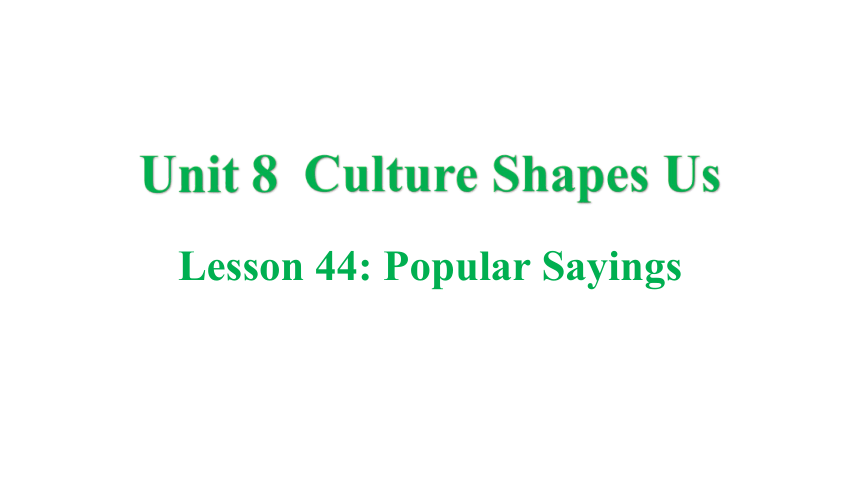
|
|
| 格式 | pptx | ||
| 文件大小 | 900.5KB | ||
| 资源类型 | 教案 | ||
| 版本资源 | 冀教版 | ||
| 科目 | 英语 | ||
| 更新时间 | 2024-11-25 00:00:00 | ||
图片预览

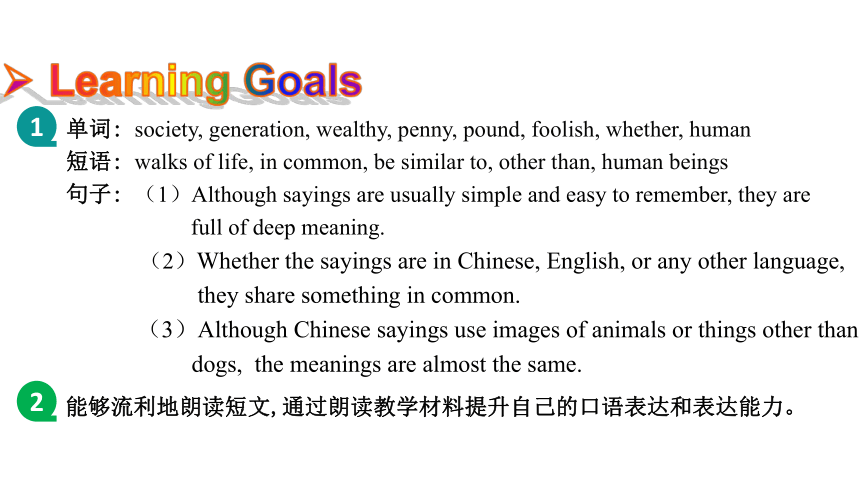
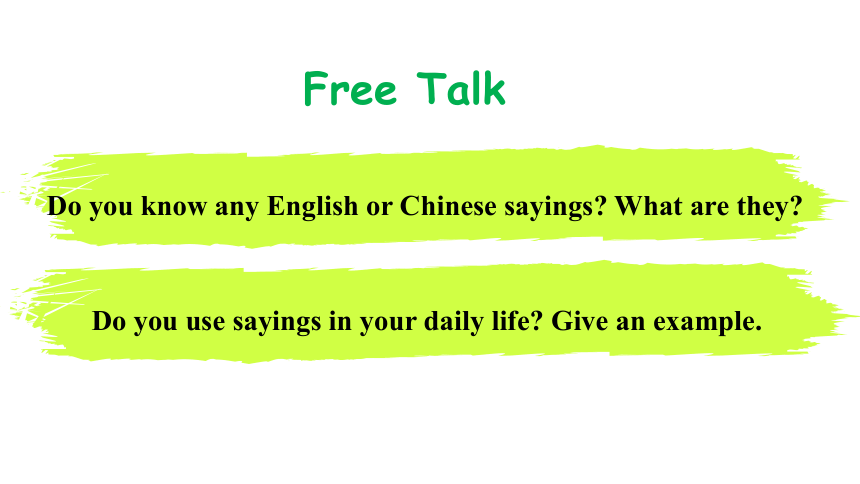
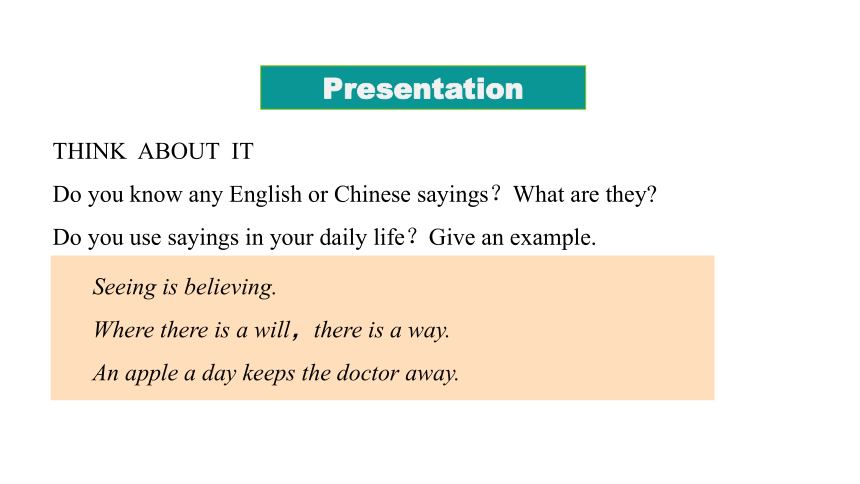
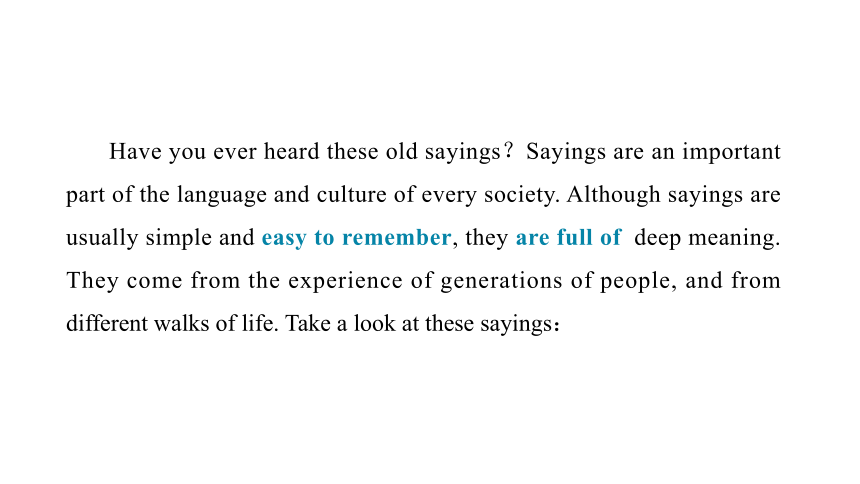
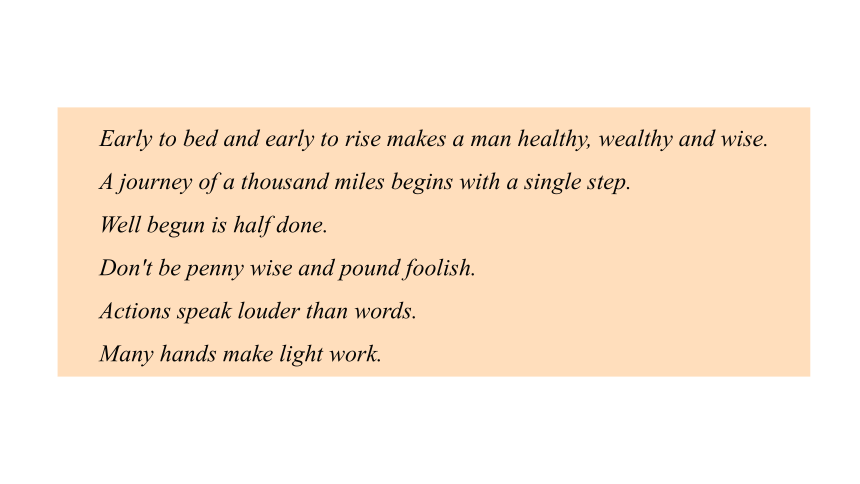
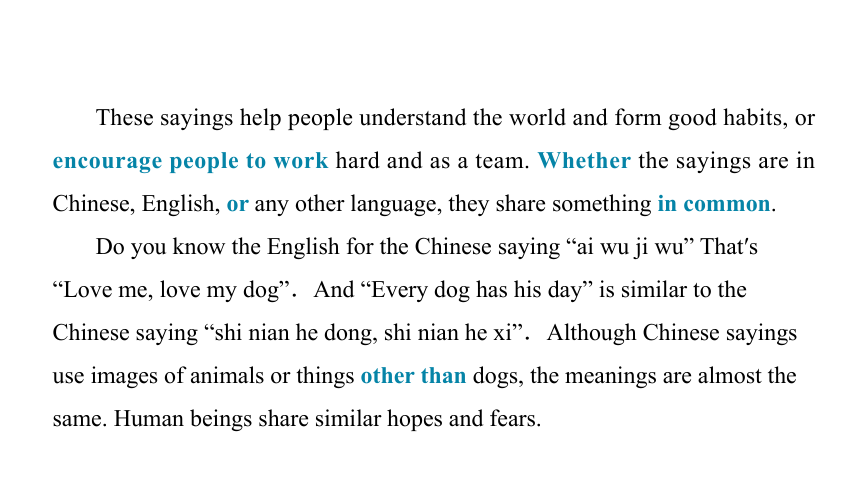
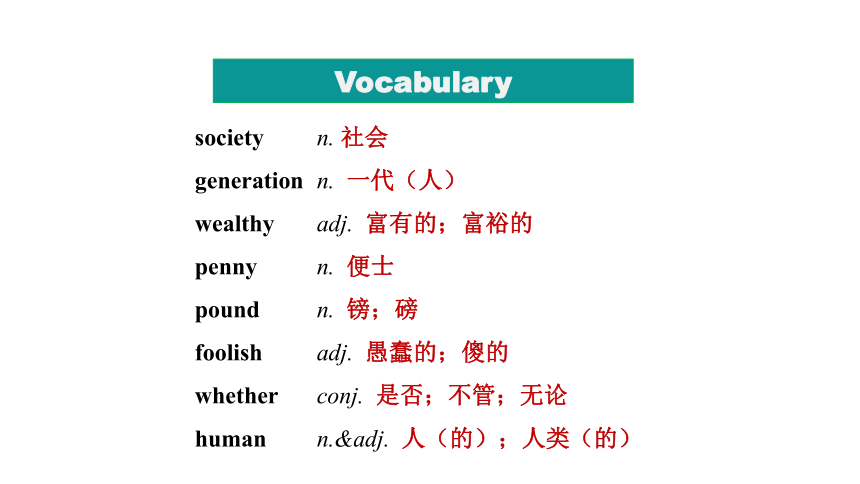
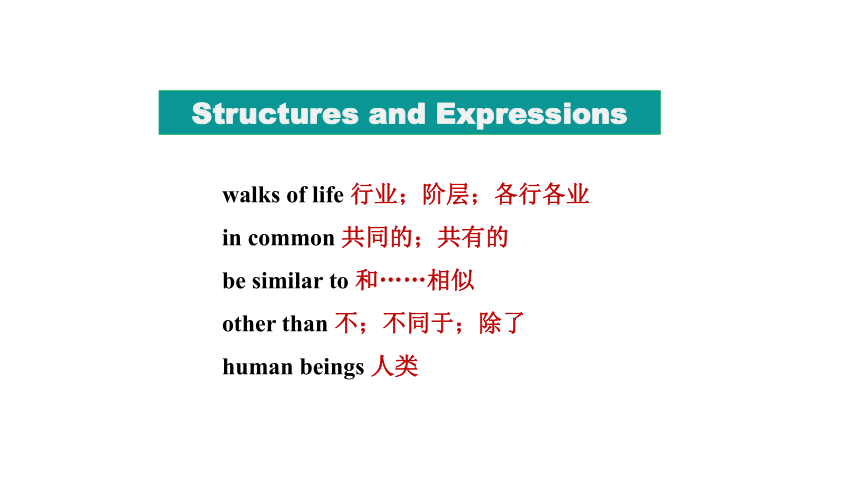
文档简介
(共26张PPT)
Lesson 44: Popular Sayings
Unit 8 Culture Shapes Us
单词: society, generation, wealthy, penny, pound, foolish, whether, human
短语: walks of life, in common, be similar to, other than, human beings
句子: (1)Although sayings are usually simple and easy to remember, they are
full of deep meaning.
(2)Whether the sayings are in Chinese, English, or any other language,
they share something in common.
(3)Although Chinese sayings use images of animals or things other than
dogs, the meanings are almost the same.
Learning Goals
1
能够流利地朗读短文,通过朗读教学材料提升自己的口语表达和表达能力。
2
Free Talk
Do you know any English or Chinese sayings What are they
Do you use sayings in your daily life Give an example.
Presentation
THINK ABOUT IT
Do you know any English or Chinese sayings?What are they
Do you use sayings in your daily life?Give an example.
Seeing is believing.
Where there is a will,there is a way.
An apple a day keeps the doctor away.
Have you ever heard these old sayings?Sayings are an important part of the language and culture of every society. Although sayings are usually simple and easy to remember, they are full of deep meaning. They come from the experience of generations of people, and from different walks of life. Take a look at these sayings:
Early to bed and early to rise makes a man healthy, wealthy and wise.
A journey of a thousand miles begins with a single step.
Well begun is half done.
Don't be penny wise and pound foolish.
Actions speak louder than words.
Many hands make light work.
These sayings help people understand the world and form good habits, or encourage people to work hard and as a team. Whether the sayings are in Chinese, English, or any other language, they share something in common.
Do you know the English for the Chinese saying “ai wu ji wu” That′s “Love me, love my dog”.And “Every dog has his day” is similar to the Chinese saying “shi nian he dong, shi nian he xi”.Although Chinese sayings use images of animals or things other than dogs, the meanings are almost the same. Human beings share similar hopes and fears.
Vocabulary
society
generation
wealthy
penny
pound
foolish
whether
human
n. 社会
n. 一代(人)
adj. 富有的;富裕的
n. 便士
n. 镑;磅
adj. 愚蠢的;傻的
conj. 是否;不管;无论
n.&adj. 人(的);人类(的)
walks of life 行业;阶层;各行各业
in common 共同的;共有的
be similar to 和……相似
other than 不;不同于;除了
human beings 人类
Structures and Expressions
Let’s do it!
1. Read the Chinese sayings below and find the matching
English expressions from the lesson.
爱屋及乌。 Love me, love my dog.
眼见为实。
十年河东,十年河西。
行动重于言辞。
千里之行,始于足下。
众人拾材火焰高。
不要小事聪明,大事糊涂。
有志者事竟成。
Seeing is believing.
Every dog has his day.
A journey of a thousand miles begins with a single step.
Actions speak louder than words.
Where there is a will, there is a way.
Don’t be penny wise and pound foolish.
Many hands make light work.
1. Seeing is believing. We warmly welcome you to visit our factory.
2. _______________________ It is very important to make a good start.
3. Cleaning the room will not take long if we all help. You know.
_________________________
4. ______________________________We should do more and speak less.
5. Although you failed the exam, you shouldn't give up. Remember
_____________________________
2. Fill in the blanks using the sayings from the lesson.
Many hands make light work.
Well begun is half done.
where there is a will, there is a way.
Actions speak louder than words.
3. Work in pairs. Discuss the meanings of the following sayings.
Can you find the matching Chinese sayings Then make
sentences with the sayings you have learned.
When in Rome, do as the Romans do.
First come, first served.
It's never too late to mend.
No pain, no gain.
入乡随俗。
先到先得。
亡羊补牢,为时未晚。
没有付出就没有收获。
More sayings
A friend in need is a friend indeed.(患难见真情)
He who has never been to the Great Wall is not a true man.
(不到长城非好汉)
You can not teach an old dog new tricks.
(江山易改本性难移)
A penny saved is a penny earned.
(省钱就是赚钱)
East, west, home is best.
(金窝,银窝,不如自己的草窝)
1. Although sayings are usually simple and easy to remember,
they are full of deep meaning. 虽然谚语通常简单易记,它们
充满了深意。
(1)句式“be+形容词+不定式”表示“很……做某事”。
※ Her life is full of happiness. 她的生活充满快乐。
(2)be full of 的意思是“充满;装满”,同义短语是 be filled with。
※It's difficult to solve this problem. 很难解决这个问题。
Language points
2. These sayings help people understand the world and form
good habits, or encourage people to work hard and as a team.
这些谚语有助于人们了解世界,形成良好的习惯,或鼓励人
们努力工作,作为一个团队。
encourage sb. to do sth. 的意思是“鼓励某人做某事”。
※ My parents often encourage me to catch up with others.
父母经常鼓励我赶上别人。
3. Whether the sayings are in Chinese, English, or any other
language, they share something in common. 无论是汉语、
英语还是其他语言中的俗语,它们都有共同之处。
(1)本句中由 whether… or… 引导的分句作状语,意思是“无论……,
还是……”。
※ Whether he drives or (whether he) takes the train,he’ll arrive here on time.
无论是驾车还是坐火车,他将准时到达这里。
【辨析 】 whether 与 if
这两个词表示“是否”时,可以互换,但是仍有区别。
① 句中有or not时,只能用whether,不能用if。
※ I don't know whether or not he will come.
我不知道他是否会来。
② 引导宾语从句时,并且把从句放在句首表强调时,此时只用whether,不用if。
※ Whether he will come I'm not sure.
我不确定他是否会来。
③ 从句做介词宾语时只用whether不用if。
※It depends on whether weather will be fine.
这取决于天气是否会好。
④ 在动词不定式之前时,只能用whether不能用if。
※ We haven't decided whether to stay.
我们还没有决定是否留下来。
⑤ 在引导主语从句、表语从句、同位语从句时一般用whether不用if。
※Whther it is true remains a question. (主语从句)
那是不是个真的还是个问题。
※The question is whether it is true. (表语从句)
问题是是不是真的。
⑥ if还可以引导条件状语从句,意为“如果”,而whether没有此用法。
※ If I climb up a tree, I can see farther.
如果我爬到一棵树上,那么我可以看到更远。
(2)in common 的意思是“共同 ( 做 ) 的;共用的;公有的”。
※ Jenny and Danny have no background in common.
詹妮和丹尼没有共同的背景。
※ In common with many Chinese, Mary likes dumplings very much.
同很多中国人一样,玛丽非常喜欢吃饺子。
4. Although Chinese sayings use images of animals or things
other than dogs, the meanings are almost the same.
虽然中国谚语使用的是动物或其他事物的形象而不是狗,
但其含义几乎是相同的。
other than 的意思是“不同于,非;除了”。
※The fact is quite other than what you think. 事实和你想得完全不一样。
※There's nothing here other than a table.
这里除了一张桌子外,没别的东西。
一、根据句意用适当的介词填空。
1. This restaurant is full ______ people.
2. I'll introduce ______ my friends.
3. Chinese culture is different ______ American culture.
4. Danny can sing this song ______ Chinese now.
5. The teacher explained the question ______ us just now.
of
to
to
from
in
Practice
二、用 if 和 whether 填空。
1. I don't know ________ my teacher will give me some advice or not.
2. I don't care ___________ she will show me her new book.
3. ________ Yao Ming will come to our city is not sure.
4. The problem is ________ you have understood your parents.
5. We will go to a picnic ________ it doesn't rain tomorrow
whether
whether/if
Whether
whether
if
Sum up
1. Vocabulary:
society, generation, wealthy, penny, pound, foolish, whether,
human
2. Structures and expressions:
walks of life、in common、be similar to、other than、human beings
3. Important sentences:
(1)Although sayings are usually simple and easy to remember, they are
full of deep meaning.
(2)Whether the sayings are in Chinese, English, or any other language,
they share something in common.
(3)Although Chinese sayings use images of animals or things other than
dogs, the meanings are almost the same.
Homework
To find more sayings after class and show them in class.
Lesson 44: Popular Sayings
Unit 8 Culture Shapes Us
单词: society, generation, wealthy, penny, pound, foolish, whether, human
短语: walks of life, in common, be similar to, other than, human beings
句子: (1)Although sayings are usually simple and easy to remember, they are
full of deep meaning.
(2)Whether the sayings are in Chinese, English, or any other language,
they share something in common.
(3)Although Chinese sayings use images of animals or things other than
dogs, the meanings are almost the same.
Learning Goals
1
能够流利地朗读短文,通过朗读教学材料提升自己的口语表达和表达能力。
2
Free Talk
Do you know any English or Chinese sayings What are they
Do you use sayings in your daily life Give an example.
Presentation
THINK ABOUT IT
Do you know any English or Chinese sayings?What are they
Do you use sayings in your daily life?Give an example.
Seeing is believing.
Where there is a will,there is a way.
An apple a day keeps the doctor away.
Have you ever heard these old sayings?Sayings are an important part of the language and culture of every society. Although sayings are usually simple and easy to remember, they are full of deep meaning. They come from the experience of generations of people, and from different walks of life. Take a look at these sayings:
Early to bed and early to rise makes a man healthy, wealthy and wise.
A journey of a thousand miles begins with a single step.
Well begun is half done.
Don't be penny wise and pound foolish.
Actions speak louder than words.
Many hands make light work.
These sayings help people understand the world and form good habits, or encourage people to work hard and as a team. Whether the sayings are in Chinese, English, or any other language, they share something in common.
Do you know the English for the Chinese saying “ai wu ji wu” That′s “Love me, love my dog”.And “Every dog has his day” is similar to the Chinese saying “shi nian he dong, shi nian he xi”.Although Chinese sayings use images of animals or things other than dogs, the meanings are almost the same. Human beings share similar hopes and fears.
Vocabulary
society
generation
wealthy
penny
pound
foolish
whether
human
n. 社会
n. 一代(人)
adj. 富有的;富裕的
n. 便士
n. 镑;磅
adj. 愚蠢的;傻的
conj. 是否;不管;无论
n.&adj. 人(的);人类(的)
walks of life 行业;阶层;各行各业
in common 共同的;共有的
be similar to 和……相似
other than 不;不同于;除了
human beings 人类
Structures and Expressions
Let’s do it!
1. Read the Chinese sayings below and find the matching
English expressions from the lesson.
爱屋及乌。 Love me, love my dog.
眼见为实。
十年河东,十年河西。
行动重于言辞。
千里之行,始于足下。
众人拾材火焰高。
不要小事聪明,大事糊涂。
有志者事竟成。
Seeing is believing.
Every dog has his day.
A journey of a thousand miles begins with a single step.
Actions speak louder than words.
Where there is a will, there is a way.
Don’t be penny wise and pound foolish.
Many hands make light work.
1. Seeing is believing. We warmly welcome you to visit our factory.
2. _______________________ It is very important to make a good start.
3. Cleaning the room will not take long if we all help. You know.
_________________________
4. ______________________________We should do more and speak less.
5. Although you failed the exam, you shouldn't give up. Remember
_____________________________
2. Fill in the blanks using the sayings from the lesson.
Many hands make light work.
Well begun is half done.
where there is a will, there is a way.
Actions speak louder than words.
3. Work in pairs. Discuss the meanings of the following sayings.
Can you find the matching Chinese sayings Then make
sentences with the sayings you have learned.
When in Rome, do as the Romans do.
First come, first served.
It's never too late to mend.
No pain, no gain.
入乡随俗。
先到先得。
亡羊补牢,为时未晚。
没有付出就没有收获。
More sayings
A friend in need is a friend indeed.(患难见真情)
He who has never been to the Great Wall is not a true man.
(不到长城非好汉)
You can not teach an old dog new tricks.
(江山易改本性难移)
A penny saved is a penny earned.
(省钱就是赚钱)
East, west, home is best.
(金窝,银窝,不如自己的草窝)
1. Although sayings are usually simple and easy to remember,
they are full of deep meaning. 虽然谚语通常简单易记,它们
充满了深意。
(1)句式“be+形容词+不定式”表示“很……做某事”。
※ Her life is full of happiness. 她的生活充满快乐。
(2)be full of 的意思是“充满;装满”,同义短语是 be filled with。
※It's difficult to solve this problem. 很难解决这个问题。
Language points
2. These sayings help people understand the world and form
good habits, or encourage people to work hard and as a team.
这些谚语有助于人们了解世界,形成良好的习惯,或鼓励人
们努力工作,作为一个团队。
encourage sb. to do sth. 的意思是“鼓励某人做某事”。
※ My parents often encourage me to catch up with others.
父母经常鼓励我赶上别人。
3. Whether the sayings are in Chinese, English, or any other
language, they share something in common. 无论是汉语、
英语还是其他语言中的俗语,它们都有共同之处。
(1)本句中由 whether… or… 引导的分句作状语,意思是“无论……,
还是……”。
※ Whether he drives or (whether he) takes the train,he’ll arrive here on time.
无论是驾车还是坐火车,他将准时到达这里。
【辨析 】 whether 与 if
这两个词表示“是否”时,可以互换,但是仍有区别。
① 句中有or not时,只能用whether,不能用if。
※ I don't know whether or not he will come.
我不知道他是否会来。
② 引导宾语从句时,并且把从句放在句首表强调时,此时只用whether,不用if。
※ Whether he will come I'm not sure.
我不确定他是否会来。
③ 从句做介词宾语时只用whether不用if。
※It depends on whether weather will be fine.
这取决于天气是否会好。
④ 在动词不定式之前时,只能用whether不能用if。
※ We haven't decided whether to stay.
我们还没有决定是否留下来。
⑤ 在引导主语从句、表语从句、同位语从句时一般用whether不用if。
※Whther it is true remains a question. (主语从句)
那是不是个真的还是个问题。
※The question is whether it is true. (表语从句)
问题是是不是真的。
⑥ if还可以引导条件状语从句,意为“如果”,而whether没有此用法。
※ If I climb up a tree, I can see farther.
如果我爬到一棵树上,那么我可以看到更远。
(2)in common 的意思是“共同 ( 做 ) 的;共用的;公有的”。
※ Jenny and Danny have no background in common.
詹妮和丹尼没有共同的背景。
※ In common with many Chinese, Mary likes dumplings very much.
同很多中国人一样,玛丽非常喜欢吃饺子。
4. Although Chinese sayings use images of animals or things
other than dogs, the meanings are almost the same.
虽然中国谚语使用的是动物或其他事物的形象而不是狗,
但其含义几乎是相同的。
other than 的意思是“不同于,非;除了”。
※The fact is quite other than what you think. 事实和你想得完全不一样。
※There's nothing here other than a table.
这里除了一张桌子外,没别的东西。
一、根据句意用适当的介词填空。
1. This restaurant is full ______ people.
2. I'll introduce ______ my friends.
3. Chinese culture is different ______ American culture.
4. Danny can sing this song ______ Chinese now.
5. The teacher explained the question ______ us just now.
of
to
to
from
in
Practice
二、用 if 和 whether 填空。
1. I don't know ________ my teacher will give me some advice or not.
2. I don't care ___________ she will show me her new book.
3. ________ Yao Ming will come to our city is not sure.
4. The problem is ________ you have understood your parents.
5. We will go to a picnic ________ it doesn't rain tomorrow
whether
whether/if
Whether
whether
if
Sum up
1. Vocabulary:
society, generation, wealthy, penny, pound, foolish, whether,
human
2. Structures and expressions:
walks of life、in common、be similar to、other than、human beings
3. Important sentences:
(1)Although sayings are usually simple and easy to remember, they are
full of deep meaning.
(2)Whether the sayings are in Chinese, English, or any other language,
they share something in common.
(3)Although Chinese sayings use images of animals or things other than
dogs, the meanings are almost the same.
Homework
To find more sayings after class and show them in class.
同课章节目录
- Unit 7 Work for Peace
- Lesson 37 Don't Fight!
- Lesson 38 Making School a Better Place
- Lesson 39 The Dove and the Olive Branch
- Lesson 40 The UN—Power of Words
- Lesson 41 Jenny's Good Advice
- Lesson 42 Peace at Last
- Unit Review
- Unit 8 Culture Shapes Us
- Lesson 43 A Visit to Chinatown
- Lesson 44 Popular Sayings
- Lesson 45 Different Manners
- Lesson 46 Home to Many Cultures
- Lesson 47 Good Manners
- Lesson 48 Supper with the Bradshaws
- Unit Review
- Unit 9 Communication
- Lesson 49 Get Along with Others
- Lesson 50 Tips for Good Communication
- Lesson 51 What Could Be Wrong?
- Lesson 52 The Power of a Smile
- Lesson 53 Working in Groups
- Lesson 54 How Embarrassing!
- Unit Review
- Unit 10 Get Ready for the Future
- Lesson 55 Look into the Future
- Lesson 56 Manage Your Time
- Lesson 57 Best Wishes
- Lesson 58 Ms.Liu's Speech
- Lesson 59 Keep Your Choices Open
- Lesson 60 Get a Good Education
- Unit Review
